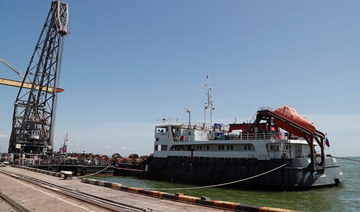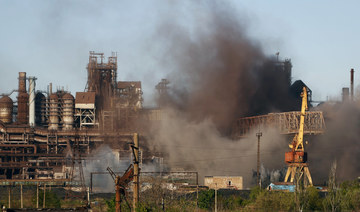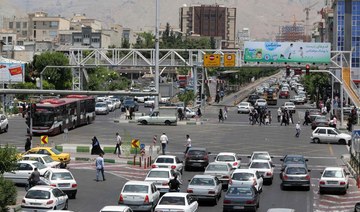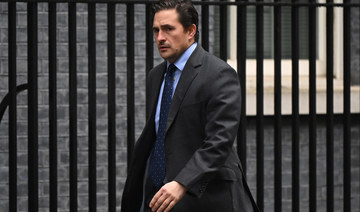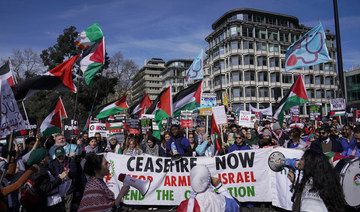WARSAW: Some residents of the devastated Ukrainian city of Mariupol who managed to escape are saying they were given no choice but to travel to Russia in what the Kyiv government regards as “deportations.”
After spending weeks in a Mariupol basement and following the death of her father, who was killed in a rocket attack, Tetiana decided to leave her city to try to save her nine-year-old daughter.
With no mobile network or any possibility of communicating, she took advantage of a lull in the shelling to go to an assembly point arranged by pro-Russian authorities to find out about ways out.
There, she was told going to Russia was the only option.
“We were in shock. We did not want to go to Russia,” the 38-year-old accountant said on the phone from Riga in Latvia where she has since sought refuge with her family.
“How can you go to a country that wants to kill you?“
For several weeks, Ukrainian authorities have been accusing Moscow of “illegally transferring” more than a million Ukrainians to Russia or to the parts of Ukraine currently controlled by Russian forces.
A Russian defense ministry official, Mikhail Mizintsev, confirmed the one million number but said the transfers of civilians was only being done to “evacuate” them away from “dangerous areas.”
Some civilians have indeed been forced to go toward Russia because travel to Ukrainian-held areas was blocked by fighting.
Speaking to AFP after crossing from Russia into Estonia, Yelyzaveta, originally from Izyum, a city in the east currently held by Russian forces, said this was the case for her.
“It was impossible to go toward Ukraine,” Tetiana, who asked not to be identified, told AFP.
Like Tetiana, two other families from Mariupol — where the Ukrainian government says 20,000 people were killed, said they too were forced to go to Russia.
Svitlana, an employee in a large industrial concern, also hid in a basement with her husband and parents in-law in Mariupol until some Russian soldiers ordered them to a part of the city fully in Russian hands.
“When an armed man tells you that, you can’t really say no,” said the 46-year-old, who has since been able to travel to Lviv in western Ukraine.
Her family was initially taken to Novoazovsk, a small town near Mariupol that is in the hands of Russia-backed separatists.
There they stayed for four days in a school.
They were then transferred to Starobesheve, where they were put up in a crowded community center where people slept on the floor.
“The worst was the smell of dirty feet, dirty bodies. It stayed on our things even after we washed them many times,” Svitlana said.
Three days later, the family was interrogated in a building occupied by separatist police.
They had to answer written questions about whether they had relatives in the Ukrainian army, their fingerprints were taken and they had to hand over their phones for checks.
In a separate room, the men had to undress to show they did not have any Ukrainian patriotic tattoos or combat wounds — a sign that they might be in the military.
“My husband had to take off everything except his underwear and his socks,” Svitlana said.
“We also deleted all photos and social media from our phones,” she said, fearing possible repercussions because of her “pro-Ukrainian position.”
Ivan Druz, 23, who left Mariupol with his half-brother in April, suffered the same treatment in Starobesheve.
He was then hoping to go to territory controlled by Ukraine but after a lot of moving around within Russian-occupied areas, Druz, who is now in Riga, was told it was not possible.
“At first they tire you out and then they tell you that you can only leave in one direction,” he said.
After arriving at the Russian border, he had to undress and answer questions about chats with his aunt in Ukrainian.
“They asked me why she was writing to me in Ukrainian” and “wanted to check that I was not a Nazi,” he said.
Once in Russia, the families of Tetiana and Druz were sent to Taganrog, around 100 kilometers (62 miles) from Mariupol.
Just after arriving, they were told by officials that they had to travel by train to Vladimir — around 1,000 kilometers further north.
From there, Ivan and his half-brother had to leave again, this time to the city of Murom, 130 kilometers to the southeast, where they were put up in a hostel for refugees.
Thanks to Russian friends, the families of Ivan, Tetyana and Svitlana eventually traveled to Moscow and took buses for Latvia or Estonia where Ukrainian refugees are being welcomed.
“Once in Latvia, we finally felt free,” Tetyana said.
‘No choice’: The Ukrainians forced to flee to Russia
https://arab.news/yc6ag
‘No choice’: The Ukrainians forced to flee to Russia
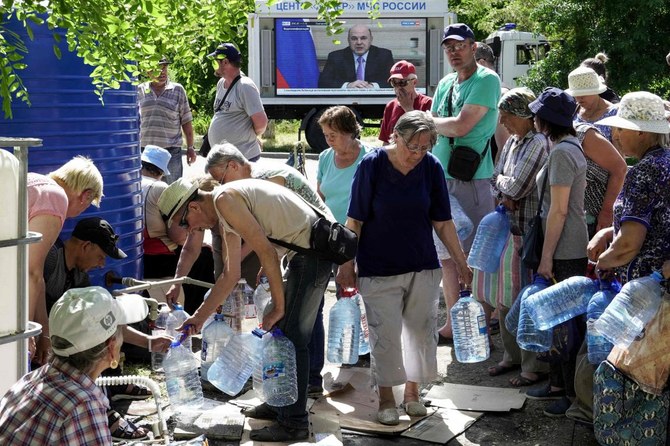
- Ukrainian authorities have been accusing Moscow of "illegally transferring" more than a million Ukrainians to Russia
- A Russian defence ministry official said the transfers of civilians was only being done to "evacuate" them away from "dangerous areas"
NATO condemns Russian ‘malign activities’ on its territory
NATO allies “express their deep concern over Russia’s hybrid actions, which constitute a threat to allied security“
BRUSSELS: NATO on Thursday condemned Russian “malign activities” on its territory, saying actions like disinformation, sabotage, violence and cyber interference threatened the alliance’s security.
The incidents “are part of an intensifying campaign of activities” Russia is carrying out across the Euro-Atlantic area and NATO allies “express their deep concern over Russia’s hybrid actions, which constitute a threat to allied security,” NATO said in a statement.
Authorities in the Czech Republic, Estonia, Germany, Latvia, Lithuania, Poland and Britain have recently investigated and charged people in connection with “hostile state activity.”
NATO said allies would work together to deter and defend against the hybrid actions and that they would remain steadfast in supporting Ukraine as it struggles to fend off Russia’s invasion, now in its third year.
Last month, a 20-year-old British man was charged with masterminding an arson plot against a Ukrainian-linked target in London. Moscow’s ambassador Andrey Kelin dismissed claims of links to Russia as “absurd” and “unfounded.”
In late March, Czech authorities said they had busted a Moscow-financed network that spread Russian propaganda and wielded influence across Europe, including in the European Parliament.
NATO on Thursday condemned Russian “malign activities” on its territory, saying actions like disinformation, sabotage, violence and cyber interference threatened the alliance’s security. (AFP/File)
Israeli private eye arrested in UK over alleged hacking for US PR firm

- An initial attempt to extradite Amit Forlit to the United Sates was thrown out by a judge at Westminster Magistrates’ Court on Thursday
- Forlit was arrested under an Interpol red notice at London’s Heathrow Airport
LONDON: An Israeli private investigator wanted by the United States was arrested in London over allegations that he carried out a cyberespionage campaign on behalf of an unidentified American PR firm, a London court heard on Thursday.
An initial attempt to extradite Amit Forlit to the United Sates was thrown out by a judge at Westminster Magistrates’ Court on Thursday on a legal technicality.
Amy Labram, a lawyer representing the United States, had told the court that Forlit “is accused of engaging in a hack for hire scheme.”
Labram said that the US allegations include that an unnamed Washington-based PR and lobbying firm paid one of Forlit’s companies 16 million pounds ($20 million) “to gather intelligence relating to the Argentinian debt crisis.”
Forlit was arrested under an Interpol red notice at London’s Heathrow Airport as he was trying to board a flight to Israel, according to the USauthorities.
Forlit is wanted in the US on three charges: one count of conspiracy to commit computer hacking, one count of conspiracy to commit wire fraud and one count of wire fraud.
A judge ruled that the attempt to extradite Forlit by the United States could not continue as he was not produced at court within the timeframe required under British extradition law.
“He was not produced at court as soon as practicable and the consequences of that ... he must – I have no discretion – he must be discharged,” Judge Michael Snow ruled.
Forlit and his lawyer did not immediately return messages seeking comment. The Federal Bureau of Investigation did not immediately return a message.
Forlit has separately been accused of computer hacking in New York by aviation executive Farhad Azima. Azima, whose emails were stolen and used against him in a 2020 trial in London, is suing Forlit and others in federal court in Manhattan.
Forlit has previously acknowledged retrieving Azima’s emails but has denied hacking, telling Reuters he innocently stumbled across the messages “on the web.”
Death toll jumps to at least 48 as a search continues in southern China highway collapse
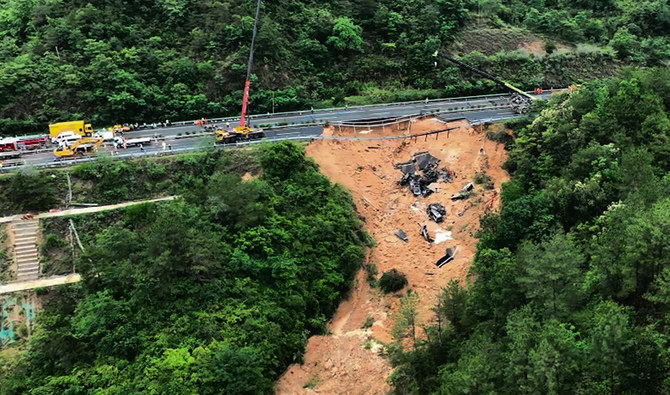
- One side of four-lane highway in Meizhou city gave way after a month of heavy rains
- Twenty-three vehicles fell down a steep slope, some sending up flames as they caught fire
BEIJING: The death toll from a collapsed highway in southeastern China climbed to 48 on Thursday as searchers dug for a second day through a treacherous and mountainous area.
One side of the four-lane highway in the city of Meizhou gave way about 2 a.m. on Wednesday after a month of heavy rains in Guangdong province. Twenty-three vehicles fell down a steep slope, some sending up flames as they caught fire. Construction cranes were used to lift out the burnt-out and mutilated vehicles.
Officials in Meizhou said three other people were unidentified, pending DNA testing. It wasn’t immediately clear if they had died, which would bring the death toll to 51. Another 30 people had non-life-threatening injuries.
The search was still ongoing, Meizhou city Mayor Wang Hui said at a late-afternoon news conference. No foreigners have been found among the victims, he said.
Search work has been hampered by rain and land and gravel sliding down the slope. The disaster left a curving earth-colored gash in the otherwise verdant forest landscape. Excavators dug out a wider area on the slope.
“Because some of the vehicles involved caught fire, the difficulty of the rescue operation has increased,” said Wen Yongdeng, the Communist Party secretary for the Meizhou emergency management bureau.
“Most of the vehicles were buried in soil during the collapse, with a large volume of soil covering them,” he said.
He added that the prolonged heavy rainfall has saturated soil in the area, “making it prone to secondary disasters during the rescue process.”
Over 56 centimeters (22 inches) of rain has fallen in the past four weeks in the county where the roadway collapsed, more than four times as much as last year. Some villages in Meizhou flooded in early April, and the city has seen more rain in recent days.
Parts of Guangdong province have seen record rains and flooding in the past two weeks, as well as hail. A tornado killed five people in Guangzhou, the provincial capital, during rain and hail storms last weekend.
The highway section collapsed on the first day of a five-day May Day holiday, when many Chinese are traveling at home and abroad.
Chinese leader Xi Jinping said that all of China’s regions should improve their monitoring and early warning measures and investigate any risks to ensure the safety of the public and social stability, state broadcaster CCTV said.
UK Veteran’s Minister Mercer to risk jail over Afghanistan inquiry
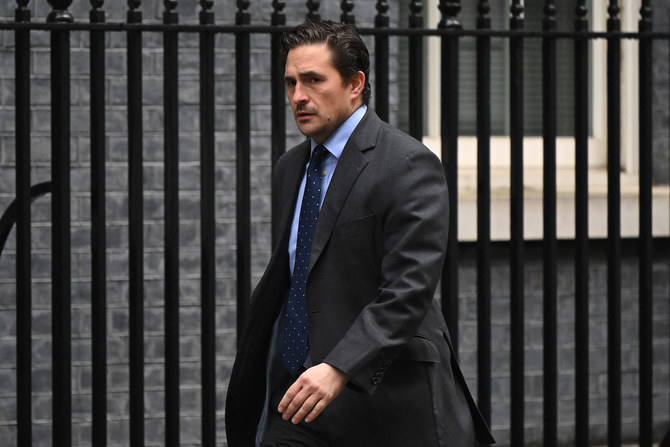
- Friends suggest minister will refuse to hand over identities of whistleblowers over fears for their well-being
- Mercer faces potential 52-week jail term, which would cost him his role as a minister and MP
LONDON: UK Veteran’s Minister Johnny Mercer will risk prison by not revealing the identities of whistleblowers to an inquiry investigating the killings of innocent people in Afghanistan.
The Times reported that friends of the MP had suggested he would rather be a “man of integrity” over the matter ahead of a deadline to hand the names to the inquiry, chaired by Lord Justice Haddon-Cave, next week.
Mercer has already given evidence to the inquiry, which is investigating allegations of extrajudicial killings and cover-ups by UK Special Forces between 2010 and 2013.
Appearing in February, he said a Special Forces soldier told him that in 2017 he was asked to carry a weapon to plant on an unarmed civilian to make them seem like an enemy combatant. He refused to reveal the source and others out of fear for their safety, with suggestions that some may be suffering from post-traumatic stress disorder and could be mentally vulnerable.
Haddon-Cave gave Mercer until April 5 to reveal the names, which was later extended. Failure to comply, he was warned, could result in a year-long prison term, which would cost him his job as a minister and his position as an MP. He could also face a fine.
One friend of the MP told The Times: “The inquiry doesn’t seem to realise that nothing will destroy their authority more than putting the veterans’ minister in the dock — the one man the military community trusts.
“If they do this, no one from the military community will want to co-operate with the inquiry. They seem to think Mercer will fold under the pressure and they will get their way. But he won’t. He will go down as a man of integrity and the inquiry will lose all support.”
Former Armed Forces Minister James Heappey said Mercer should reveal the identities of his sources.
“I admire Johnny enormously for the way that he has done politics under his own rules with an incredible sense of mission … He is a remarkable man but on this particular point I think for him, for his family and actually for the credibility of the inquiry I think he does need to disclose these names,” Heappey said.
On Friday, the inquiry will examine the Ministry of Defence’s failure to provide evidence to it on time. It is still waiting to hear from senior officials, including former Defence Secretary Ben Wallace.
It has also heard allegations that Gen. Gwen Jenkins, future national security advisor and former Special Boat Service head, locked away a report into claims of extrajudicial killings instead of passing it to military police.
Mercer also suggested during the inquiry, which began in December 2022, that the next head of the UK Army Lt. Gen. Sir Roly Walker had given “unbelievable” testimony over claims that Special Air Service personnel had killed unarmed Afghans.
An investigation by The Times, meanwhile, has suggested that former members of specialist Afghan Army units CF 333 and ATF 444 could provide crucial witness testimony to the inquiry but that their subsequent relocation from Afghanistan was overseen by MoD officials in a potential conflict of interest.
Many had their asylum claims to come to the UK rejected, a decision now under review.
Arrests made at protests against UK arms sales to Israel
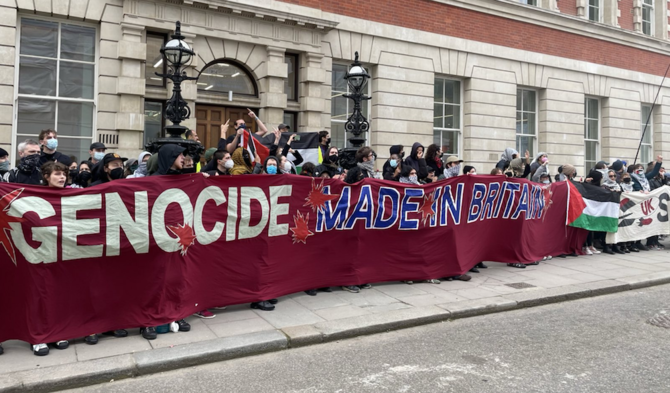
- Police in London, Glasgow called to deal with demonstrations
- ‘Protesters must stay within the law,’ Metropolitan Police says
LONDON: Police in London said they made three arrests at demonstrations held on Wednesday to protest against the sale of UK arms to Israel.
Protesters gathered outside the offices of the Department for Business and Trade in central London and more than 1,000 workers and trade unionists held protests at sites linked to BAE Systems across the UK.
“We are policing a protest in Admiralty Place and Horse Guards Parade,” the Metropolitan Police said in a statement.
“Officers have made three arrests after protesters blocked access to a building. Protesters must stay within the law.”
Police Scotland also confirmed its officers were called to a site in Glasgow to deal with protesters on Wednesday.
Members of Workers for a Free Palestine said the group was “escalating its tactics” by targeting BAE Systems cities and the British government department on the same day, the Independent reported.
“Our movement forced the issue of an arms embargo onto the table and polling shows the majority of the British public want to see arms sales to Israel banned, yet the government and also the Labour Party continue to ignore the will of the people,” a WFP protester named Tania, who took to the streets in London, told the newspaper.
“The government has sought to play down the scale of its arms supplies to Israel but the reality is UK arms and military support play a vital role in the Israeli war machine and evidence that three British aid workers were killed by a drone partly produced in the UK shows the extent of British complicity in Israel’s genocide,” she said.
Another protester, named Jamie, who was demonstrating in Glasgow, said: “Our fundamental aim is for the UK government to introduce an arms embargo. It’s the morally right thing to do.
“It’s vital that action is taken. It’s been almost seven months of death and destruction in Palestine and the idea that that is being committed by weapons that are being produced in our neighborhoods is horrifying.
“Our long-term goal is an arms embargo from the government but our short-term aim here today is to just disrupt business as usual for BAE, to disrupt the manufacture, to cost them time, cost them money and slow down the trade of weapons to Israel.”
BAE Systems said it respected people’s “right to protest peacefully” and that its arms exports complied with regulations.
“The ongoing violence in the Middle East is having a devastating impact on civilians in the region and we hope the parties involved find a way to end the violence as soon as possible,” it said.
“We operate under the tightest regulation and comply fully with all applicable defense export controls, which are subject to ongoing assessment.”



